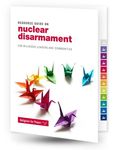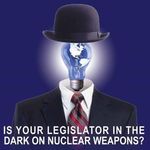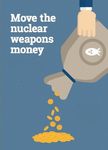Nuclear remembrance and action week - August 1-9, 2020
←
→
Page content transcription
If your browser does not render page correctly, please read the page content below
Nuclear remembrance and action week
August 1-9, 2020
Some events and suggested actions for nuclear abolition
to commemorate the 75th anniversaries
of the nuclear bombings of Hiroshima and Nagasaki
Abolition 2000
Abolition 2000 is an international network of organisations and individuals working for the global prohibition and
elimination of nuclear weapons and on incremental measures leading to this goal.
The Network, established in 1995, provides a forum for the exchange of information and development of joint
initiatives and campaigns. Over 2000 organisations from more than 90 countries have supported the Abolition 2000
aims and founding statement.
www.abolition2000.org www.facebook.com/Abolition2000 secretariat.abolition2000@gmail.comTable of contents
1. International Events
a. Official Hiroshima and Nagasaki ceremonies
b. Peace Wave
c. International Fast
d. 2020 World Conference against A and H Bombs
e. Youth Peace Week and UN International Youth Day
f. Ribbon 2020
g. Other events and event Calendars
2. Suggested Actions
a. Sign the Hibakusha Appeal
b. Fold an origami crane for peace
c. Move the nuclear weapons money (to better things)
d. Organise a prayer vigil or church service
e. Engage your legislators – mayors and parliamentarians
f. Hold a film event
1. International Events
a. Official Hiroshima and Nagasaki ceremonies
The official Hiroshima commemoration ceremony will take place on Thursday August 6 from 8am-9am Japan
time. The UN Secretary-General is expected to either attend the event or provide a video message if
pandemic conditions prevent his attendance. Click here to watch it live. For more information see Hiroshima
Peace Memorial Ceremony and Notice regarding Hiroshima Memorial 2020 ceremony procedures in light of
COVID-19 pandemic.
The official Nagasaki commemoration ceremony will take place on Sunday August 9 from 11am-12pm Japan
time. Click here to watch it live. For more information see Nagasaki Peace Memorial Ceremony.
Hiroshima peace flame and commemoration ceremony.b. Peace Wave
From August 6 at 8:15am, the time that the nuclear bomb was detonated over
Hiroshima, until August 9 at 11:02am, the time the nuclear bomb was detonated over
Nagasaki, peace activists around the world will undertake individual and/or group
actions as part of a ‘Peace Wave’.
You can join the peace wave by undertaking your own small, creative, social media
action from home or interesting location, or joining an action in your community. For
more information and to register your action, please visit Peace Wave 2020.
c. International Fast
Every year since 1984, a small group of peace campaigners from France and Germany
have fasted from August 6 until 9 in commemoration of the nuclear bombings and to
call for the global abolition of nuclear weapons. In recent years, they have been joined
by fasters in the Ivory Coast, New Zealand, UK and USA..
This year, in the light of the Coronavirus pandemic and its devastating consequences, the fast will also
highlight the many millions around the world threatened by malnutrition or famine, while governments
continue to spend $100 billion per year on nuclear weapons and $1.9 trillion per year on weapons and war.
Participants in the Fast will donate the money they would on food during that time to organizations or
charities helping to feed the destitute.
You are invited to join the fast. Contact Dominique Lalanne (France) or Marc Morgan (UK).
d. 2020 World Conference against A and H Bombs
Every year Gensuikyo (the Japan Council against Atomic and
Hydrogen Bombs) holds a world conference against A and H
Bombs in Japan in conjunction with the commemorations of
Hiroshima and Nagasaki Days.
The theme for the conference this year is “With the Hibakusha, Let Us Achieve a Nuclear Weapon-free,
Peaceful and Just World - for the Future of the Humankind and Our Planet"
Due to COVID-19 pandemic, the 2020 world conference will be held by a series of webinar sessions from
August 2 until August 9. There will be three main sessions (2 hours each) on August 2, 6 and 9, plus some
additional special sessions. For more information including the draft program see 2020 World Conference on
A and H Bombs.
e. Youth Peace Week and UN International Youth Day
Youth Peace Week is from August 3rd to
9th 2020. Originally established in New
Zealand as Schools Peace Week with the
support of the New Zealand government,
the week spread to other countries. This
year it has been broadened to Youth
Peace Week as it only suits schools in the
Southern Hemisphere (schools in the
North are mostly on summer break). The
theme this year is Celebrating Diversity. For more information and to register your youth action, see Youth
Peace Week, visit the Youth Peace Week facebook page or contact the Youth Peace Week coordinator.
Abolition 2000 also encourages those commemorating UN International Youth Day on August 12, to ensure
that peace and nuclear disarmament are included as themes to your action or event.f. Ribbon 2020 – Tangible hope for No nuclear war
The Ribbon International was founded as an artistic event to commemorate the Hiroshima and Nagasaki
anniversaries. On August 4, 1985, fifteen miles of Ribbons encircled the Pentagon and other important
monuments: With the message of “What I cannot bear to think of as lost forever in a nuclear war”. The
Atomic Bomb Dome in Hiroshima was also encircled. Various other Ribbon events have taken place since
then. On August 1st 2020 at 10:00 am (EDT), The Ribbon International will hold a Ribbon 2020 memorial
event by Zoom. You are invited to join the event with your friends/family. Hold your Ribbon in front of the
Zoom screen, and pray for a nuclear free world. For details see The Ribbon International 2020 event, or
contact The Ribbon International.
g. Other events and event Calendars
There will be numerous local and national events to commemorate the 75th anniversary. Some of these will
be listed on Abolition 2000 events calendar. Others will be listed on the FCNL Nuclear Calendar or the World
Beyond War events calendar. We encourage you to check these calendars.
2. Actions
a. Sign the Hibakusha Appeal
In April 2016, Hidankyo (the Japan Confederation of A and H Bomb Sufferers Organizations) launched an
appeal for the total elimination of nuclear weapons. The appeal, which was co-sponsored by the Korean and
US associations of Atomic Bomb Victims and supported by Gensuikyo, calls on all governments to conclude a
treaty to prohibit and eliminate nuclear weapons, i.e. a nuclear weapons convention. People around the
world are invited to endorse the appeal. Click here to see the appeal. Send your endorsement to Hidankyo
b. Fold an origami crane for peace
It is believed that folding 1,000 origami cranes brings one a peaceful and
healthy life. Following the nuclear bombing of Hiroshima and Nagasaki in
1945, origami crane folding became an action for peace and nuclear
abolition, particularly for young people. This arose from the story of
Sadako Sasaki, a child at the time of the nuclear bombing of Hiroshima.
Sadako contracted leukaemia from the radioactive fallout. She tried to
make 1000 cranes but passed away before she could finish. Her
classmates finished the 1000 cranes for her, and then made crane
making their message for peace. They raised funds for a memorial to
Sadako in the Hiroshima Peace Park. Origami crane making is now taught
in schools around the world.
Action: Organise a crane-making workshop at your local school, youth group, workplace or place of worship.
Resources: Video on folding a paper crane, The story of Sadako and the 1000 origami cranes, The Peace
Crane Projectc. Move the Nuclear Weapons Money
Money makes the world go around. The corporations manufacturing nuclear
weapons are fueling the nuclear arms race for their own financial gain. They
actively lobby their parliaments and governments to continue allocating the
funds to nuclear weapons. And they support think tanks and other public
initiatives to promote the ‘need’ for nuclear weapons maintenance,
modernization or expansion.
You can help curb the power of the nuclear weapons corporations by:
• Encouraging your university, church, city, bank, pension fund, religious
organisation or government to divest from the nuclear weapons
industry (and checking that you are not investing in nuclear weapons);
• Joining the Move the Nuclear Weapons Money social media action.
Post your photo and quote on what the money could instead support
as a social media meme. Click here to see examples.
• If you are in a nuclear-armed country you can take action to cut the nuclear weapons budgets, and
redirect this money to public health, economic recovery (post COVID-19), climate action and
sustainable development.
For more information visit Move the Nuclear Weapons Money or Don’t Bank on the Bomb. Contact
info@nuclearweaponsmoney.org.
d. Organise a prayer vigil or church service
Religious and faith-based communities can reflect on the morality of
nuclear weapons, the role that ethics can play to abolish nuclear
weapons, and the peace-making power of religious leadership and
action.
Actions:
• Organise a special service at your church, mosque, synagogue,
temple or other place of worship.
• Endorse the Joint statement of religious leaders and legislators for a
nuclear-weapon-free world. See
Resources:
• Nuclear Disarmament for Religious Leaders and Communities.
Available in Arabic, English, French, German, Japanese and Spanish.
e. Engage your legislators – mayors and parliamentarians
Mayors/Cities: Over 8000 cities are members of Mayors for Peace, which is led by the Mayor of Hiroshima.
See www.mayorsforpeace.org.
Actions:
• Organise a commemoration event at your city council or at a suitable site in
your city (Peace Garden, Peace memorial….). Invite the mayor to speak.
Present the Hiroshima Peace Declaration which will be released on August 6;
• Ask your city council to adopt a motion honouring the 75th anniversary of
the nuclear bombing of Hiroshima and Nagasaki, and supporting the call for
the total abolition of nuclear weapons.
• Ask your city council to divest city funds from nuclear weapons corporations.Parliamentarians: Parliamentarians play a key role in determining government policy regarding nuclear
abolition. They are able to ask questions in parliament (to which governments have to reply), propose
motions, release joint statements and organise events.
Over 700 parliamentarians from across the political spectrum have
joined Parliamentarians for Nuclear Non-proliferation and
Disarmament (PNND) in order to learn more about nuclear
disarmament and enhance their impact globally. PNND has been
instrumental in a number of developments including the adoption
(by consensus) of a resolution by the Inter Parliamentary Union
Assembly (178 parliaments) calling on parliaments to work with
governments to eliminate the role of nuclear weapons in security
doctrines and negotiate a nuclear weapons convention (a global
treaty including the nuclear-armed states on the abolition and
elimination of nuclear weapons).
Action: Invite your legislator/parliamentarian to join PNND and take action for nuclear disarmament. For
parliamentary action ideas see Parliamentary Action Plan for a Nuclear-Weapon-Free World
f. Hold a film event – actual or virtual
Organise a nuclear disarmament film event.
Documentaries include Nuclear Savage, The Nuns, The
Priests and The Bombs, and Where the Wind Blew.
Movies include The Man Who Saved the World, Thirteen
Days (based on the Cuban Missile Crisis), Crimson Tide
and The Peacemaker.
Contact info@pnnd.org for information and assistance
with screening Where the Wind Blew or The Man who
Saved the World.
Karipbek Kuyukov, artist and second generation victim of
nuclear weapons who features in Where the Wind Blew.You can also read



























































